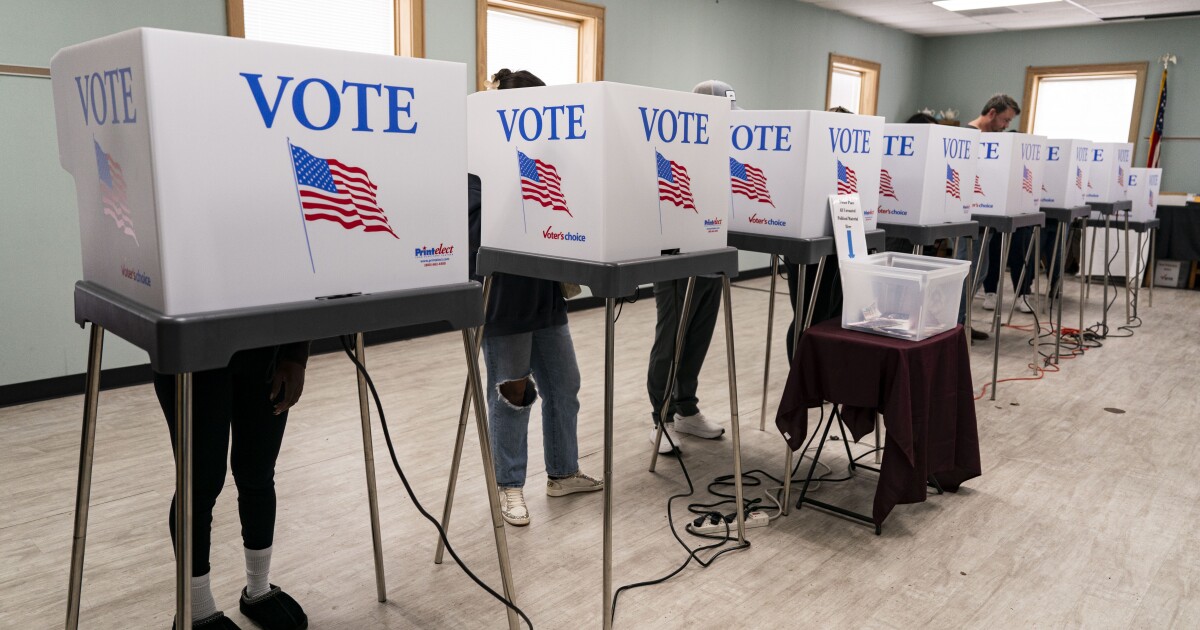
Fluctuating interest rates, the sting of inflation and geopolitical turmoil have been snuffing out loan production, but many bank executives say the biggest factor dampening borrower pipelines is uncertainty about the outcome of Tuesday's election.
No matter who wins the U.S. presidential election — Vice President Kamala Harris or former President Donald Trump — bank leaders expect debt origination to start picking back up, if only at a creep, once the results are clear.
Phil Green, chairman and CEO of Cullen/Frost Bankers, said in an interview after the Texas bank's earnings call last week that most of his company's business clients are anticipating strong performance in 2025, regardless of which way the election goes.
"If there was one thing that people said that was affecting their business today, it wasn't labor, it wasn't supply chain, it wasn't interest rates, it was the election," Green said. "People are waiting until it's over. I don't know that there's any empirical reason for that. I think it's a human reaction to uncertainty."
D.A. Davidson analysts wrote in a Monday note that although they would see a Trump victory as a benefit to near-term bank stock trading, their longer-term outlook is positive for the industry
"Presuming lower rates and a sound economy, we would expect loan growth to improve regardless of the next White House inhabitant, as many banks have suggested election uncertainty, along with still elevated interest rates, is the current sticking point for customers," the note said. "In many cases, clarity on the future landscape may trump (pun intended) the election outcome."
In early October, the D.A. Davidson analysts forecasted
Still, even after the votes are counted, bankers aren't expecting a sudden boom in loans. Though economic factors have started to fall into place as interest rates have begun to come down, most bank executives say the response from clients won't be immediate.
Mary Katherine Dubose, head of Commercial Banking Specialized Industries at Wells Fargo, said that when the outlook of financial policies are in flux, it's difficult for businesses to gauge what levers they can afford to pull.
"I think probably with some level of uncertainty out there around the outcome of the election, it's been more challenging for businesses to plan," she said.
Nearly half of commercial businesses listed election uncertainty as a top concern in the third quarter, according to a Wells Fargo Commercial Business Sentiment report, a 14-percentage point increase from the previous quarter.
Fifth Third Bancorp CEO Tim Spence said in an interview last month that his bank's
"The byproduct of that is [clients] tend to want to take a wait-and-see to get through the election," Spence said. "We'll have clarity on who won and what the breakdown between the executive branch and Congress is. You get a bit of a view into what the governing platform is going to look like."
He added that until there's more confidence in the path of interest rates and in the political environment, businesses won't know "the rules and costs" of borrowing.
When businesses struggle to plan, so too do their lenders.
Dominic Ng, chairman, president and CEO of East West Bancorp, said on the company's third-quarter earnings call it would be "unwise" to offer predictions regarding the result of the election, or even if that result will be immediately known. Loan growth has been unusually tepid for the Southern California-based bank, Ng added, but East West has a strong capital cushion.
When the bank gets the call for loans from its customers, it will respond, Ng said.
"But if for some reason, the economic condition is still a little bit muddy, and it makes it difficult for customers to function and make capital investments and try to accelerate growth, we naturally will slow down a bit," he said.
James Brogden, president at Simmons First National Corp., said on the company's recent earnings call that he was trying to give a "balanced" view of 2025, noting that economic green shoots the bank has seen haven't translated into loan demand yet.
"We lean optimistic, but that optimism hasn't started to firm up yet," Brogden said. "We hope that it does, and we're going to be ready for it. And our appetite for it will be strong when it gets there."
Cautious optimism was a theme across the industry during third-quarter earnings calls, as bank executives commented that getting past the hump of the election could help loan growth. Regions Financial Chief Financial Officer David Turner said that the
During the third quarter, Regions' total loans were down 2% from the previous year. The company is expecting year-end average growth to be in line with or slightly below its 2023 level.
"We obviously are in great markets, and we think we can take advantage of those when a little bit of this uncertainty … dissipates a bit, and get on the growth trajectory in 2025," Turner said.
Moving in parallel with their clients, banks expect to see a benefit from the additional certainty that election results should bring.
Green said that San Antonio-based Cullen/Frost has been handling unknowns with caution, maintaining both capital and balance sheet flexibility to deal with potential economic shifts.
"We've kept our powder dry because we're not sure where interest rates are going to go, how soon they'll get there," Green said. "In a sense, we're just like those businesses I've been talking about, who are waiting to see how things break. And then we'll make some decisions."
Kevin Wack contributed to this story.



